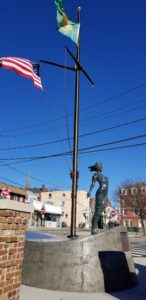
Promoting Ocean History
Because of the importance of the ocean today – in terms of climate, health, economy, food supply, recreation, coastal habitation, and many other areas – the time has come to historicize our human relationship with the ocean. A grassroots effort to articulate principles of ocean literacy, which culminated in the adoption of international standards by UNESCO, focuses on science but includes the principle that “the oceans and humans are inextricably interconnected”(http://oceanliteracy.wp2.coexploration.org/)Here are some projects that aim to explore and promote such interconnections. Ocean history can, and should, be promoted through formal teaching as well as informal education, using various forms of popular media, museums, and art. The projects featured here are mine or ones with which I was involved; see “Fellow Fathomers” for work by others.
Oceans in Depth book series, University of Chicago Press
Read an interview with series editors Katharine Anderson and Helen M. Rozwadowski
Fathoming the Oceans Through History | TEDxBoston
University Teaching
HIST/MAST 2210, History of the Ocean, is taught regularly at UConn.
The course explores the cultural, environmental, and geopolitical history of the ocean from prehistory to the present. Examines the impact of migration, industrialization, modernization, and globalization on the relationships between people and oceans.
Athena – Public Art in New London
 The bronze statue of Athena by sculptor Renee Rhodes was dedicated in the port city of New London, Connecticut, in summer 2018. The base includes a plaque whose text is a short public history of the relationship between the people of this area and the ocean written by Helen Rozwadowski.
The bronze statue of Athena by sculptor Renee Rhodes was dedicated in the port city of New London, Connecticut, in summer 2018. The base includes a plaque whose text is a short public history of the relationship between the people of this area and the ocean written by Helen Rozwadowski.
- For more information, see New London Day: Athena sculpture installed in downtown New London
- Read plaque inscription
